Introduction: Who is Galactus?
Galactus is a name that evokes awe and intrigue among fans of the Marvel Universe. This colossal entity, often called the Devourer of Worlds, is not your regular villain. Rather, Galactus serves a unique role as a force of nature, embodying a necessary balance in the universe’s vast ecosystem. His insatiable hunger for planetary energy often puts him at odds with many heroes.
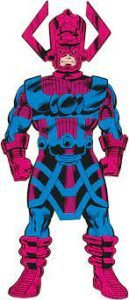 If you want to understand the grand tapestry of Marvel’s cosmic stories, you can’t ignore Galactus; though, to my chagrin, it seems that I did ignore him in my recent post about the hierarchy of Marvel’s cosmic entities. I could tell you that I left him out of that post on purpose, because I knew I was going to write a separate post about him; but let’s be honest, I just really zoned out and forgot to put him in the outline! Galactus will not be ignored! His hunger for planets not only drives many of the plotlines he’s involved in but also adds a complex layer to the Marvel narrative. Galactus is not evil in the traditional sense; his hunger is a survival imperative that often pits him against Earth’s mightiest heroes.
If you want to understand the grand tapestry of Marvel’s cosmic stories, you can’t ignore Galactus; though, to my chagrin, it seems that I did ignore him in my recent post about the hierarchy of Marvel’s cosmic entities. I could tell you that I left him out of that post on purpose, because I knew I was going to write a separate post about him; but let’s be honest, I just really zoned out and forgot to put him in the outline! Galactus will not be ignored! His hunger for planets not only drives many of the plotlines he’s involved in but also adds a complex layer to the Marvel narrative. Galactus is not evil in the traditional sense; his hunger is a survival imperative that often pits him against Earth’s mightiest heroes.
Galactus’s creation added an unparalleled level of depth to Marvel’s storytelling. Unlike other characters that occupied either the good or evil dichotomy, Galactus presented as a cosmic being with motives beyond our moral compasses. This was a bold creative choice that captured readers’ imaginations.
Understanding Galactus is paramount for any Marvel aficionado. His impact on major characters and events is vast, and his presence has shaped many pivotal moments in the Marvel timeline. This blog post will delve into the extensive history of Galactus, tracing his origins, his role in the hierarchy of Marvel’s cosmic entities, his moral ambiguity, and his involvement in major story arcs. By the end, you’ll have a comprehensive understanding of this iconic character and his significant impact on the Marvel Universe.
The Birth of Galactus: Origins and First Appearance
The Dawn of Galactus
Galactus’s story begins long before his first appearance in Marvel Comics. Originally, he was Galan of Taa, a brilliant scientist from a universe that existed before the Big Bang. This part of Galactus’s origin story was detailed in “Thor #169” (October 1969), written by Stan Lee and illustrated by Jack Kirby.
- Issue: Thor #169
- Date: October 1969
- Writer: Stan Lee
- Artist: Jack Kirby
The End of the Previous Universe
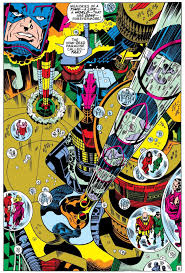 Galan lived on the planet Taa, a paradise-like world in a highly advanced civilization. However, his universe was approaching a catastrophic end, a scenario that even the advanced beings of Taa could not escape. As the universe began to collapse, Galan and a few survivors embarked on a desperate journey to find a way to save themselves.
Galan lived on the planet Taa, a paradise-like world in a highly advanced civilization. However, his universe was approaching a catastrophic end, a scenario that even the advanced beings of Taa could not escape. As the universe began to collapse, Galan and a few survivors embarked on a desperate journey to find a way to save themselves.
The Journey into the Cosmic Unknown
Galan and his companions flew into the heart of the dying universe. Their vessel encountered the Cosmic Egg, a remnant of the previous universe that contained immense power and knowledge. The Cosmic Egg was essentially a cosmic incubator, storing the potential energy needed to birth a new universe.
Transformation into Galactus
Upon contact with the Cosmic Egg, Galan’s fate was irrevocably altered. The cosmic energies within the egg enveloped him, initiating a transformation of unimaginable proportions. Galan was infused with the Power Cosmic, granting him abilities far beyond those of any mortal being. He was reborn as Galactus, a being of vast power whose very existence would play a crucial role in the new universe.
As Galactus, he became the sole survivor of the previous cosmos, now tasked with a new, albeit burdensome, purpose: to maintain balance in the universe by consuming planetary energy. This transformation not only granted him immense power but also imposed a relentless hunger that could only be satiated by devouring entire planets.
The Cosmic Egg: A Nexus of Creation and Destruction
The Cosmic Egg is a concept that represents both an end and a beginning. It encapsulated the energies and remnants of a universe that had lived and died, containing the seeds for the next iteration of reality. By interacting with the Cosmic Egg, Galan was transformed into a fundamental force within the new universe, bridging the gap between creation and destruction.
This origin story laid the foundation for Galactus’s role as a cosmic entity in the Marvel Universe. His transformation from Galan of Taa into Galactus symbolizes the cyclical nature of existence, where destruction paves the way for creation, and every end heralds a new beginning. This deep, philosophical underpinning makes Galactus one of the most compelling and enduring characters in Marvel Comics.
First Appearance in Comics
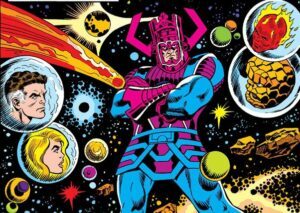
Though his transformation from Galan to the cosmic entity was detailed in a 1969 Thor comic book, Galactus actually made his debut in Fantastic Four #48 (March 1966), a landmark issue crafted by writer Stan Lee and artist Jack Kirby. This issue, the first of a three-part story arc known as “The Galactus Trilogy,” introduced Galactus alongside his herald, the Silver Surfer.
- Issue: Fantastic Four #48-50
- Date: March 1966
- Writer: Stan Lee
- Artist: Jack Kirby
The Coming of Galactus
The “Galactus Trilogy” (Fantastic Four #48-50) is one of the most iconic story arcs in Marvel Comics history. This narrative not only introduced readers to the immense threat of Galactus but also set a new standard for cosmic storytelling in comics.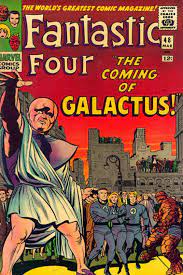
Fantastic Four #48: “The Coming of Galactus”
- Date: March 1966
The story begins with the Fantastic Four encountering strange cosmic phenomena, heralding the arrival of the Silver Surfer. The Surfer, a once-noble being named Norrin Radd, had become the herald of Galactus, tasked with finding planets for his master to consume. The Surfer’s arrival signals the imminent threat of Galactus, who descends upon Earth, intent on devouring its energy.
Fantastic Four #49: “If This Be Doomsday!”
- Date: April 1966
As Galactus begins to construct his planet-consuming machinery, the Fantastic Four, aided by the Inhuman Triton and the Watcher Uatu, scramble to stop him. The Watcher, a cosmic entity sworn to observe and not interfere, breaks his vow to aid the Earth in its darkest hour. He reveals to the Fantastic Four the existence of the Ultimate Nullifier, a powerful weapon capable of stopping Galactus.
Fantastic Four #50: “The Startling Saga of the Silver Surfer!”
- Date: May 1966
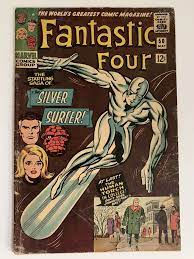 Reed Richards, the leader of the Fantastic Four, retrieves the Ultimate Nullifier with the help of the Human Torch, who ventures into Galactus’s ship. Armed with the Nullifier, Richards confronts Galactus. Recognizing the weapon’s potential to destroy him, Galactus agrees to spare Earth, but not without a price. The Silver Surfer, moved by the courage and morality of humanity (particularly Alicia Masters, the Thing’s blind girlfriend), rebels against Galactus. As punishment, Galactus banishes the Surfer to Earth, preventing him from returning to the cosmos.
Reed Richards, the leader of the Fantastic Four, retrieves the Ultimate Nullifier with the help of the Human Torch, who ventures into Galactus’s ship. Armed with the Nullifier, Richards confronts Galactus. Recognizing the weapon’s potential to destroy him, Galactus agrees to spare Earth, but not without a price. The Silver Surfer, moved by the courage and morality of humanity (particularly Alicia Masters, the Thing’s blind girlfriend), rebels against Galactus. As punishment, Galactus banishes the Surfer to Earth, preventing him from returning to the cosmos.
Key Elements of the Storyline
- Introduction of the Silver Surfer: The Silver Surfer’s complex character, torn between his duty to Galactus and his newfound admiration for humanity, adds depth to the story. (Look for more about the Silver Surfer in a future post!)
- The Ultimate Nullifier: This device, capable of annihilating anything its wielder focuses on, introduces a powerful but morally ambiguous element. Its inclusion underscores the lengths to which the heroes must go to protect their world.
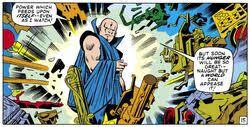 The Watcher’s Intervention: Uatu the Watcher’s decision to intervene, despite his oath of non-interference, highlights the gravity of Galactus’s threat and adds a layer of cosmic ethics to the narrative. (I probably will need to explain more about this entity in a future post. I don’t think he ever made it into any MCU plotlines, but he is featured in at least one mid-credit scene.)
The Watcher’s Intervention: Uatu the Watcher’s decision to intervene, despite his oath of non-interference, highlights the gravity of Galactus’s threat and adds a layer of cosmic ethics to the narrative. (I probably will need to explain more about this entity in a future post. I don’t think he ever made it into any MCU plotlines, but he is featured in at least one mid-credit scene.)
Ethical Dilemmas and Monumental Battles
This narrative not only set the stage for future cosmic storylines but also highlighted the ethical dilemmas and monumental battles that would define Galactus’s character. The Fantastic Four’s struggle against Galactus is not just a physical battle but a moral one, raising questions about survival, sacrifice, and the nature of good and evil.
- Moral Complexity: The Silver Surfer’s transformation from a herald of destruction to a protector of Earth underscores the complexity of Galactus’s influence. His character embodies the conflict between duty and morality.
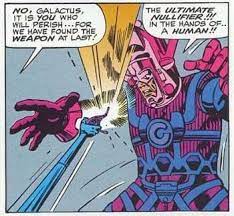 Heroic Sacrifice: Reed Richards’s willingness to wield the Ultimate Nullifier, knowing it could potentially destroy both Galactus and himself, epitomizes the heroic sacrifice often required to combat such immense threats.
Heroic Sacrifice: Reed Richards’s willingness to wield the Ultimate Nullifier, knowing it could potentially destroy both Galactus and himself, epitomizes the heroic sacrifice often required to combat such immense threats.
Impact on Marvel Comics
“The Galactus Trilogy” is a pivotal moment in comic book history. It expanded the scope of superhero stories from terrestrial threats to cosmic challenges, influencing countless future storylines. This arc established Galactus as a character of immense power and ethical ambiguity, whose presence would loom large over the Marvel Universe for decades to come.
By setting such high stakes and introducing complex moral questions, the trilogy not only captivated readers but also paved the way for the rich, interconnected cosmic mythology that defines much of Marvel’s storytelling.
The Cosmic Hierarchy: Galactus’s Role and Relationships
The Cosmic Scale
The Marvel Universe is populated by a vast array of cosmic entities, each representing different aspects of existence. These beings include Eternity (the embodiment of time), Infinity (the embodiment of space), Death, and the Living Tribunal, who maintains cosmic balance. These entities exist on a plane far above most heroes and villains, interacting with them only in times of cosmic upheaval.
Galactus’s Place Among the Stars
Galactus stands as a unique figure among these cosmic entities. While others represent fundamental forces of the universe, Galactus is a force of balance, consuming planets to maintain the equilibrium of the cosmos. His interactions with other entities often reflect his role as a necessary evil—neither inherently good nor malicious. Let’s review the entities that are above Galactus in the cosmic hierarchy and his relationship to them.
1. The One Above All
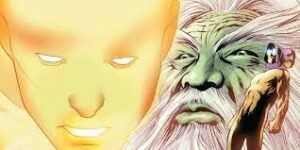 Role: Supreme being of the Marvel Universe, representing the ultimate power and often considered a metaphor for the creators themselves (Stan Lee and Jack Kirby).
Role: Supreme being of the Marvel Universe, representing the ultimate power and often considered a metaphor for the creators themselves (Stan Lee and Jack Kirby).- Authority: Ensures balance and order across all existence. The One Above All is omnipotent, omniscient, and omnipresent, making this entity the highest in the cosmic hierarchy.
- Position Relative to Galactus: The One Above All is at the absolute top, with all other entities, including Galactus, operating under its grand scheme.
2. The Beyonder
-
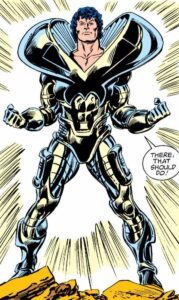
Beyonder Role: An immensely powerful entity from beyond the Marvel multiverse.
- Authority: Capable of manipulating reality on an unimaginable scale, often challenging the established cosmic order.
- Position Relative to Galactus: The Beyonder’s power surpasses nearly all other cosmic beings, including Galactus. The Beyonder’s outsider status and immense capabilities place this entity above Galactus in the hierarchy.
3. The Living Tribunal
-
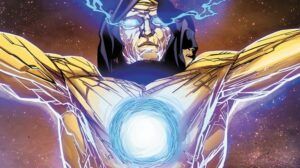
Living Tribunal Role: Multiversal entity responsible for maintaining balance across all realities. Acts as the ultimate arbiter of cosmic justice.
- Authority: Possesses three faces (Equity, Necessity, and Vengeance) that judge and ensure the balance of the multiverse. Its decisions are final and absolute.
- Position Relative to Galactus: The Living Tribunal is directly below The One Above All and is far superior to Galactus in terms of power and authority.
4. Eternity and Infinity
- Eternity
- Role: Represents all time and the living embodiment of the universe’s lifespan.
- Authority: Ensures the continuity and temporal framework of the universe.
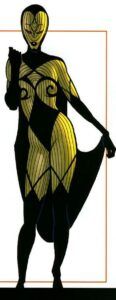
- Infinity
- Role: Represents the spatial dimensions and boundless expanse of reality.
- Authority: Provides the structural framework of the universe.
- Position Relative to Galactus: Both Eternity and Infinity are integral to the fabric of the universe and operate on a higher level than Galactus. They represent the entire universe’s lifespan and spatial dimensions, respectively, making them more fundamental to the cosmic order.
5. Death
- Role: Represents the end of life and the inevitability of mortality.
- Authority: Oversees the cycle of life and death within the universe.
- Position Relative to Galactus: Death holds a higher position in the cosmic hierarchy due to her role in the universal balance of life and death. While Galactus consumes planets to maintain equilibrium, Death governs the fundamental aspect of mortality across the cosmos.
6. The Celestials
- Role: A group of powerful cosmic beings responsible for evolutionary experiments throughout the universe.
- Authority: Shape the development of numerous civilizations and species through their experiments.
- Position Relative to Galactus: While the Celestials possess significant power and influence, their position relative to Galactus can be more situational. They are generally considered to be higher due to their ancient origins and their role in guiding cosmic evolution, but their specific interactions with Galactus can vary.
In summary, The One Above All, the Beyonder, the Living Tribunal, Eternity, Infinity, Death, and the Celestials are all considered higher than Galactus in the Marvel cosmic hierarchy. These entities hold greater power, authority, or influence over the universe’s fundamental aspects, positioning them above Galactus in this fictional universe.
Heralds of Galactus
Galactus’s presence in the Marvel Universe is often heralded by his chosen envoys. These heralds, endowed with a fraction of Galactus’s power, scout for planets suitable for consumption. Notable heralds include:
- Silver Surfer (Norrin Radd)
-
- First Appearance: Fantastic Four #48 (March 1966)
- Role: The first and most famous herald, known for his moral struggle and eventual rebellion against Galactus.
- Nova (Frankie Raye)
-
- First Appearance as Nova: Fantastic Four #244 (July 1982)
- Role: A former human granted cosmic powers, known for her fierce loyalty to Galactus.
- Terrax (Tyros)
-
- First Appearance: Fantastic Four #211 (October 1979)
- Role: A brutal and power-hungry herald who often clashed with other heroes.
These heralds are crucial to Galactus’s operations, reflecting different aspects of his character and the moral complexities of serving the Devourer of Worlds.
Good or Evil? The Moral Ambiguity of Galactus
A Necessary Evil
Galactus’s characterization as either good or evil is a subject of much debate. Unlike many traditional villains, Galactus is driven by a fundamental need—his insatiable hunger for planetary energy. This necessity places him in opposition to heroes who strive to protect their worlds, yet it also positions him as a vital component of the universe’s balance.
- Force of Nature: Galactus operates beyond human concepts of morality. His existence is akin to a natural disaster—destructive, yet a part of the cosmic order.
- Balancing Act: His consumption of planets prevents overpopulation and the subsequent imbalance of the universe’s energy.
Galactus’s Ethical Evolution
Over the decades, Galactus’s interactions with various characters have added layers to his ethical portrayal. Key storylines highlight his complex nature:
- “Fantastic Four #50” (May 1966): Galactus agrees to spare Earth, swayed by the pleas of the Silver Surfer and the use of the Ultimate Nullifier by Reed Richards. This act shows his capacity for mercy when confronted with the right arguments.
- “Thor #161-163” (February-April 1969): Thor battles Galactus, exploring themes of sacrifice and the greater good. Galactus’s willingness to compromise hints at his understanding of cosmic balance.
- “Infinity Gauntlet #1-6” (July-December 1991): During this iconic crossover event, Galactus joins forces with other cosmic entities to combat Thanos, who wields the Infinity Gauntlet. His involvement underscores his pragmatic approach to threats that could disrupt the cosmic order.
Major Story Arcs Involving Galactus
We have already explored the coming of Galactus in the Fantastic Four comics of 1966. As we’ve mentioned, his introduction in those landmark issues set the stage for more comics fun and drama for Galactus and even other yet-to-be-introduced cosmic entities. Let’s now focus our attention on other major story lines involving Galactus.
Infinity Gauntlet (1991)
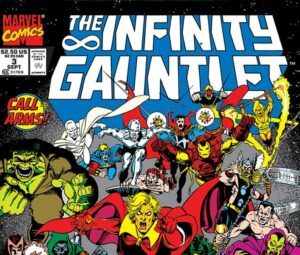 The “Infinity Gauntlet” event brought together numerous Marvel characters to face Thanos, who seeks to wield god-like power. Galactus’s role in this storyline is pivotal.
The “Infinity Gauntlet” event brought together numerous Marvel characters to face Thanos, who seeks to wield god-like power. Galactus’s role in this storyline is pivotal.
- Issues: Infinity Gauntlet #1-6
- Dates: July-December 1991
- Writer: Jim Starlin
- Artists: George Pérez and Ron Lim
Galactus allies with other cosmic entities, including Eternity, Infinity, and the Living Tribunal, to confront Thanos. This alliance highlights the times when Galactus’s goals align with those of other cosmic beings, revealing his pragmatic side and his commitment to preserving the cosmic balance. This crossover event was crucial in shaping Galactus’s character outside his usual antagonist role. While he did not wield the Gauntlet himself, his involvement underscored the gravity of the threat posed by Thanos. The ‘Infinity Gauntlet’ saga remains a significant milestone in Marvel’s storytelling, not only for its main characters but also for highlighting Galactus’s influence and reverence as a cosmic entity.
Annihilation (2006)
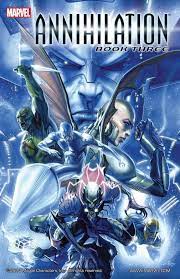 The “Annihilation” storyline sees Galactus caught in a cosmic war against the forces of Annihilus, showcasing his might and his role as a cosmic powerhouse.
The “Annihilation” storyline sees Galactus caught in a cosmic war against the forces of Annihilus, showcasing his might and his role as a cosmic powerhouse.
- Issues: Annihilation #1-6
- Dates: October 2006-March 2007
- Writer: Keith Giffen
- Artist: Andrea Di Vito
During this event, Galactus is captured and used as a weapon by Annihilus. His eventual liberation and retaliation are crucial in turning the tide of the war. This storyline emphasizes Galactus’s sheer power and the dire consequences when such a force is misused.
The Hunger (1999)
“The Hunger” arc delves into Galactus’s existential struggle and the consequences of his eternal hunger.
- Issues: Galactus the Devourer #1-6
- Dates: September 1999-February 2000
- Writer: Louise Simonson
- Artist: John Buscema
This series explores the depths of Galactus’s hunger and the lengths he will go to sate it. It presents a more introspective view of the character, examining the pain and desperation behind his actions.
The Ultimates (2015)
In a significant twist, “The Ultimates” series sees Galactus undergo a profound transformation from Devourer to Lifebringer.
- Issues: The Ultimates #1-12
- Dates: November 2015-November 2016
- Writer: Al Ewing
- Artist: Kenneth Rocafort
The transformation is initiated by the superhero team known as The Ultimates, who aim to solve cosmic-level problems. This shift marks a new era for Galactus, where he seeks to restore life to barren worlds rather than consuming them. This change in role dramatically alters his interactions with the rest of the Marvel Universe and redefines his character.
Galactus in Modern Marvel: Recent Appearances and Future
The Lifebringer Era
Galactus’s transformation into the Lifebringer represents one of the most significant changes in his character history. This new role as a creator rather than a destroyer has far-reaching implications for the Marvel Universe.
- Impact on Cosmic Landscape: Galactus’s new purpose affects how other cosmic entities and superheroes perceive him. No longer a looming threat, he becomes a symbol of hope and renewal.
- New Storylines and Alliances: As the Lifebringer, Galactus forms new alliances and encounters different challenges. This era opens up fresh narrative possibilities and expands his role beyond that of a simple antagonist.
Recent Storylines
Galactus continues to play a vital role in contemporary Marvel Comics, with recent storylines reflecting his ongoing evolution.
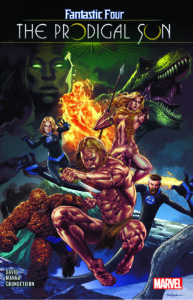 “Fantastic Four: The Prodigal Sun” (July 2019): This issue sees Galactus return to Earth, interacting with the Fantastic Four in his Lifebringer form.
“Fantastic Four: The Prodigal Sun” (July 2019): This issue sees Galactus return to Earth, interacting with the Fantastic Four in his Lifebringer form.-
- Issue: Fantastic Four: The Prodigal Sun #1
- Date: July 2019
- Writer: Peter David
- Artist: Francesco Manna
- “Thor” (2020): The “Devourer King” arc features Thor as the new herald of Galactus, combining their powers to combat a greater threat.
-
- Issues: Thor #1-6
- Dates: January-June 2020
- Writer: Donny Cates
- Artist: Nic Klein
These storylines showcase Galactus’s continued relevance and the dynamic nature of his character within the Marvel Universe.
Conclusion: The Ever-Evolving Legacy of Galactus
Summing Up Galactus’s Journey
Galactus’s journey through Marvel Comics is a testament to the character’s complexity and enduring appeal. From his origins as Galan of Taa to his transformation into the Lifebringer, Galactus has navigated a path filled with moral ambiguity, cosmic battles, and profound evolution. His role in the Marvel Universe transcends that of a mere villain, positioning him as a vital force within the cosmic order.
The Future of the (former) Devourer
As Marvel continues to expand its universe, both in comics and other media, the future of Galactus holds exciting possibilities. Whether as a formidable adversary or a cosmic savior, Galactus remains a cornerstone of Marvel’s cosmic narratives. Fans can look forward to seeing how this iconic character will continue to shape the stories and challenges of the Marvel Universe.
What do you think about Galactus’s role in the Marvel Universe? Is he a villain or a necessary force? Share your thoughts in the comments below! For those interested in diving deeper into Galactus’s stories, check out our recommended reading list that we included above. Stay tuned for more in-depth explorations of your favorite Marvel characters.
For some more Galactus fun, check out “How Powerful Is Galactus” from The Imaginary Axis:
For further reading outside of Super Hero Collectors, click here.
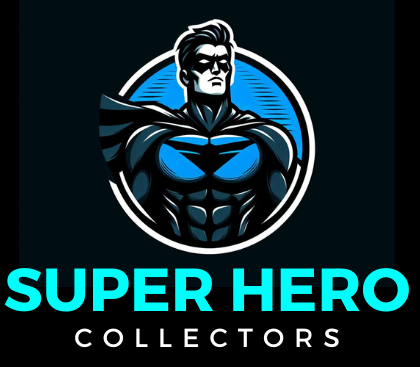
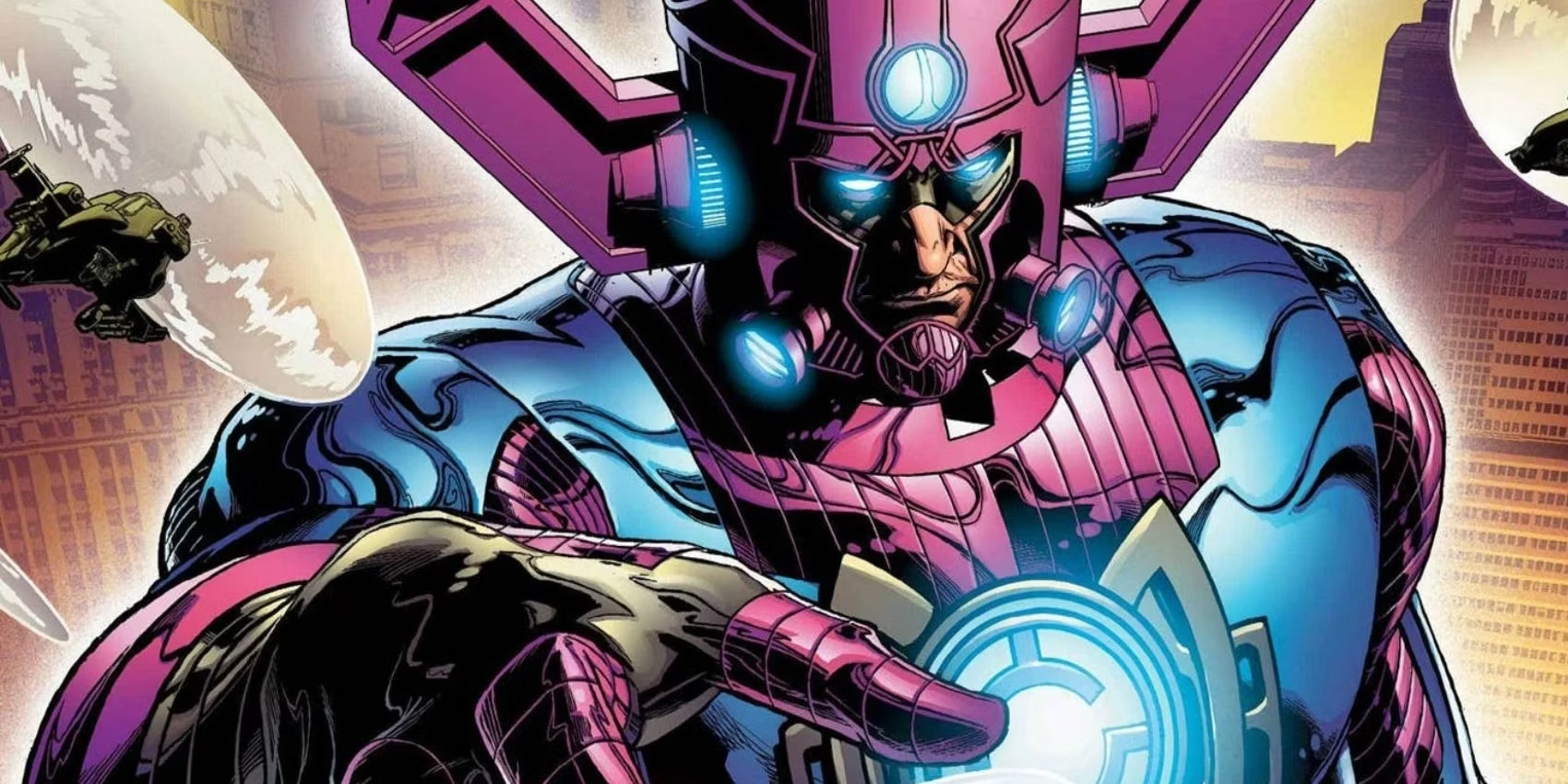
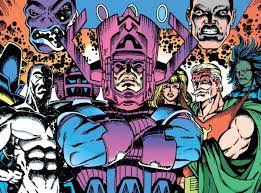
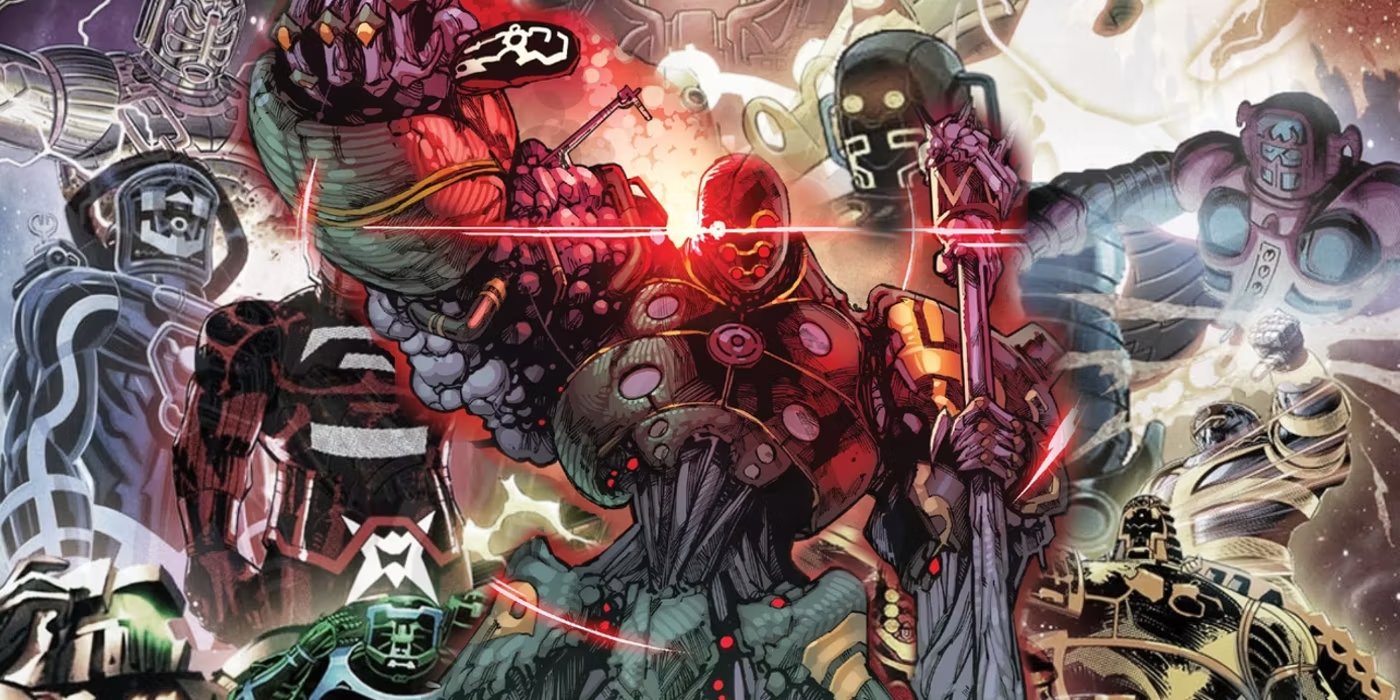
What a deep dive into the cosmic abyss of the Marvel Universe! This blog post brilliantly captures the grandeur and complexity of Galactus, a character who transcends the usual good vs. evil dichotomy. It’s fascinating to see how Galactus’s insatiable hunger and moral ambiguity make him more than just a typical villain—he’s a cosmic force that keeps the balance of the universe.
I appreciate the thorough breakdown of his origins, especially how he transitioned from Galan of Taa to the Devourer of Worlds. It’s intriguing how his necessity to consume planets creates such a compelling conflict with our heroes. The post does a great job highlighting key story arcs like “The Galactus Trilogy” and “Infinity Gauntlet,” which showcase his formidable presence and the high stakes he brings to the Marvel cosmos.
Overall, this blog post is a must-read for anyone looking to grasp the intricate layers of Marvel’s cosmic storytelling. It’s well-researched, engaging, and provides a comprehensive overview of Galactus’s significance. Thanks for sharing this wonderful article!
Hi Kavitha,
Welcome back! I always appreciate your comments. I am glad you found this article engaging and informative! Please tell your friends about Superherocollectors.com! I hope they can get some superhero fun too!
– Scott
Hey,
This is suchan interesting article.
I am going to share this with my nephew and his friends as I am sure they are going to love it.
I will share your other articles with them too, and if they have any questions or anything then I will get back in touch, if that is OK?
Thank you for sharing and keep up the amazing work.
All the best,
Tom
HI Tom!
I’m glad you enjoyed my post. It’s great that you are sharing this with your nephew and friends. They can always ask questions on the posts and leave comments themselves, if they want. I look forward to hearing from them!
– Scott
Great post, Scott! I really enjoyed your comprehensive look at Galactus. My favorite! It’s fascinating to see how he has evolved from his early days in the “Fantastic Four” comics to his current role in the Marvel Universe.
One section that particularly caught my attention was “The Birth of Galactus: Origins and First Appearance.” The transformation of Galan of Taa into Galactus through the Cosmic Egg is such a pivotal moment. The significance of the Cosmic Egg in the Marvel Universe is so important, as it encapsulates both the end of one universe and the beginning of another, symbolizing the cyclical nature of existence. It’s intriguing how Marvel uses this concept to explore deeper philosophical themes and enrich the narratives of other characters and storylines. This really adds a layer of depth to Galactus’s character and the overall Marvel mythology. Thanks again for the great read!
Hi Claire,
Thank you for reading my post about Galactus and leaving a comment. So glad you enjoyed it! Galactus is indeed a fascinating character with a rich history in the Marvel Universe.
You’re absolutely right about the Cosmic Egg’s significance—it beautifully represents the cyclical nature of existence, highlighting the perpetual cycle of death and rebirth.
Marvel’s use of these themes to weave intricate and thought-provoking storylines is what makes characters like Galactus so compelling. It’s always fascinating to see how these cosmic elements influence the stories of other characters and expand the universe’s mythology.
Thanks again for your kind words and for sharing your insights. Please drop in again for more superhero content!
– Scott
I was touched by your honesty and forthrightness when you mentioned that you mistakingly omitted Galactus from your post about the hierarchy of Marvel’s cosmic entities particularly because I think you could have gotten away with the excuse that you had a separate post planned for Galactus. Previously, I had read your post about the hierarchy of Marvel’s cosmic entities and it was so rich, that I didn’t notice that any major character in the Marvel Universe was missing. I guess we (your readers) are simply fortunate that the omission happened because we now get to enjoy a real deep dive into Galactus.
I must say however, that I am more impressed by your openness, than by this impressive post on Galactus – comprehensive and informative as it is. I look forward to reading your next post.
Hi Oluseyi,
Welcome back and thank you for your kind words. I’m happy you are finding enjoyment in my posts.
– Scott
Impressive analysis of Galactus and his position in the Marvel universe! I’m particularly excited about the way you explore the ethical complexity surrounding his character and his significance in Marvel’s history. It’s intriguing to see how Galactus is interconnected with other cosmic entities and his role in maintaining the balance of the universe. I can’t wait to read more about his evolution and the impact he has on the Marvel Universe!
Hi Michael,
Thank you for visiting and for your kind words. Galactus is indeed a character rich with history and moral ambiguity, which makes him such an intriguing figure to explore. His evolution over time and the impact he has on the Marvel Universe offer endless avenues for discussion. Stay tuned for more deep dives into his character development and the broader implications of his actions within the Marvel cosmos. i hope you can take time to browse my website. There may be other posts that will interest you.
Your excitement and engagement mean a lot, and I look forward to sharing more insights with you soon! Please come back for more superhero fun!
– Scott
I love your honesty, Scott! Well done. It makes your reader trust you more. You must have an incredible collection of comics—no doubt worth a mint! I love the use of ornate and archaic vocabulary that these authors use, too.
This is another epic article about archetypes and mythologies. I wonder if you prefer comics to actual mythology and archetypical studies. And how were the creators of these characters inspired?
A fascinating read, Scott. I’m sure your fans can’t wait for the next deep dive. Me neither!
Blessings and Success.
Linden
Hi Linden,
As always, i appreciate your observations!
I can’t say that I’ve really studied mythology in depth. I enjoy reading novels that involve mythology. For instance, I enjoyed reading the Percy Jackson novels about the Greek and Roman myths. I believe that author also wrote a series about Norse mythology.
How the creators were inspired would make a fascinating study. I think they knew some things about mythology. I don’t know about the most recent writers and authors, but Stan Lee said this: “I wouldn’t know a gamma ray if I saw it,” said Lee. “The whole trick is to make something seem as if you gave it a lot of thought and did a lot of research, but I never had time for research!”
I’m thrilled you enjoyed my post, and I hope to see you again for more superhero fun!
– Scott
Hi Scott,
I really didn’t have any idea about the Galactus character, but I have given it a read, and below is my observation:
Your deep dive into Galactus’s role in the Marvel Universe is nothing short of impressive! The way you captured his complex evolution from Galan of Taa to the Lifebringer, detailing his pivotal appearances in key story arcs like “The Galactus Trilogy,” “Infinity Gauntlet,” and “The Ultimates,” showcases your thorough understanding and passion for the character. Your exploration of his moral ambiguity and his interactions with other cosmic entities adds a rich layer of depth to the narrative. This is a masterful piece that truly enriches the reader’s appreciation for one of Marvel’s most iconic characters—absolutely wow-worthy!
Cheers!!
Nouman
Hi Nouman!
Thank you for reading and learning about Galactus! I really appreciate your kind words about my article.
I hope you come back soon for more superhero fun!
– Scott
What a fantastic and comprehensive exploration of Galactus’s character and his role within the Marvel Universe! Your breakdown of his origins, his place in the cosmic hierarchy, and the significant story arcs he’s been involved in is truly insightful.
In my opinion, Galactus represents one of the most intriguing aspects of Marvel’s cosmic storytelling. His presence forces both heroes and readers to grapple with complex questions about necessity, morality, and the greater good. I’m excited to see how future storylines will continue to develop his character.
One question I have is about Galactus’s transformation into the Lifebringer. How has this change affected his interactions with other cosmic entities, especially those who saw him as a necessary force of destruction?
I’d love to discuss the ethical dilemmas surrounding Galactus. His characterization as a force of nature rather than a traditional villain adds a rich layer of complexity. What are your thoughts on the moral ambiguity of his actions? Do you think his role as the Devourer was more compelling than his current role as the Lifebringer?
Looking forward to your next post, especially if it delves into the Silver Surfer or the Watcher! Keep up the great work!
HI Adnan!
Thank you so much for your kind words and thoughtful engagement with the post! I’m thrilled that you found the exploration of Galactus’s character and his role in the Marvel Universe insightful. Galactus indeed embodies some of the most complex and thought-provoking elements of cosmic storytelling, pushing both characters and readers to ponder deep moral and existential questions.
Regarding your question about Galactus’s transformation into the Lifebringer, this shift has profoundly impacted his interactions with other cosmic entities. Previously, as a force of destruction, Galactus was often seen as a necessary, albeit terrifying, force that maintained the cosmic balance by devouring planets. His transformation into the Lifebringer—a being who restores life to dead worlds—has significantly altered this dynamic. Many cosmic entities who once regarded him with fear and a sense of inevitability now have to reassess their understanding of the cosmic order and their relationships with him. This change has introduced new alliances, conflicts, and philosophical debates among the cosmic beings, highlighting the flexibility and richness of Marvel’s cosmic narrative.
The ethical dilemmas surrounding Galactus are indeed fascinating. As the Devourer of Worlds, Galactus’s actions were driven by a primal need for survival, positioning him as a force of nature rather than a malevolent villain. This portrayal allowed for a nuanced examination of morality, necessity, and sacrifice. The moral ambiguity of his role—devouring worlds to maintain balance in the universe—invites readers to consider broader ethical questions about the greater good and the costs associated with it.
As the Lifebringer, Galactus’s role has shifted to one of creation and rejuvenation, which presents a different set of moral questions. Is restoring life to dead worlds inherently more righteous than his previous role, or does it simply shift the balance in a new direction? The transformation challenges the binary perception of good versus evil and encourages a more layered understanding of morality.
Personally, I find both roles compelling in different ways. The Devourer of Worlds introduces a stark, almost elemental force of nature into the narrative, providing a unique antagonist that heroes must confront with both physical and philosophical resilience. The Lifebringer, on the other hand, opens up possibilities for redemption, change, and the cyclical nature of the universe. Each role adds depth and richness to Galactus’s character and the stories he inhabits.
I’m excited to delve into more cosmic characters like the Silver Surfer and the Watcher in future posts. Their interactions with Galactus and their own moral complexities make them equally fascinating subjects. Stay tuned for more explorations of the Marvel Universe’s vast and intricate cosmic landscape!
Thank you again for your thoughtful comment and for sparking such an engaging discussion. Your insights and questions add so much to the conversation, and I look forward to continuing this exploration with you and other readers.
This is an exciting and captivating description of the Galactus character of the Marvel Universe. This Devourer of Worlds I was not previously aware of as I have only explored the Marvel Universe to a limited degree. I do appreciate all the details and now being aware of this fascinating character.
HI Joseph!
Thank you for visiting and leaving a comment. I’m glad you found the post informative about a Marvel entity that you were not previously aware of! The Marvel comic universe has so many diverse characters, and it is fun to learn about them.
I hope you come back for more superhero fun!
– Scott
Hey Scott,
It’s a Super Hero day! Nicely done super hero stories and collections. My only one nephew was into Pokémon. I truly enjoy going out to see a good movie at the theater.
Are you and your grand kids such fans that you also dress the part of the characters? I think it is so much fun.
Thank you for sharing your excitement with us!
Theresa
Hi Theresa,
I’m thrilled that you enjoyed my site and it even looks like you probably read my About Me page. My youngest grandson is also into Pokemon. He collects the cards and watches the cartoon series.
We haven’t gotten into the whole cosplay aspect of Marvel. I do have some good friends that own a party company where they are hired to entertain at birthday parties. They dress up as Spider-Man and princesses and other fun characters.
Many of my friends are into cosplay and go to the ComicCon and PopCon here in town. I wanted to go this year, but I always was out of town or involved with other things. Next year, I am going to put more effort into going. Who knows, I might even dress up!
Please come back for more superhero fun!
– Scott
I have watched many of the blockbuster Marvel movies…but never read any of the comic books. Wow…this article was a total deep dive!! I found many aspects of the article very interesting because many of them seem to come straight out of religion. I guess that shouldn’t be so surprising to me since religion is a major source of morality for a society and the Marvel series do orient their stories around the conflict between good and evil. I do love a good story about good and evil when in the end good perseveres and conquers evil. I do not recall ever having seen Galactus in any of the Marvel movies I have seen…but that could be because I’m always a fan of the good guy so I much more appreciate the characters like Captain America =) Your retelling of Galactus’s encounter with the Cosmic Egg reminded me of the movie Star Trek 3 in which Spock’s dead body arrives on the Genesis Planet and comes back to life. This seems to be a religious theme as well. Most ancient people groups have a story of this planet being destroyed by water. The One Above All who created this planet promised that it would never be destroyed again by water. But the ancient scriptures predict that at the end of the age it will be destroyed by fire…but it’s not really a destruction but rather a purification by fire and a rebirth. Evil will be utterly destroyed during the purification process which sets this planet free from corruption to finally thrive again. So with reading your article I realized like never before that the Marvel series has incorporated many religious themes that seem to come straight out of the Old Book. Interesting indeed!! =)
HI Classy Cat,
Thank you for reading and adding to the discussion! Yes, the Marvel writers have borrowed a lot of ideas from different religions, whether it’s Christianity, Norse, Roman, Greek, New Age and others. I’m glad you noticed that as you read about Galactus.
You are correct, Galactus hasn’t appeared in Marvel movies, at least not as a part of what is considered Marvel Cinematic Universe. He did appear in Fantastic Four: Rise of the Silver Surfer. In that film he was called Gah Lak Tus. He looked more like a cloud and wasn’t his true form. The director claims they wanted to reveal his true form in a separate Silver Surfer spin off movie. I have heard that Galactus will appear in 2025 in a new Fantastic 4 movie. Hopefully, it will be a good one!
Please come back for more superhero fun!
– Scott
Hey Scott,
This article on Galactus’s journey through Marvel Comics is fantastic! It dives deep into the character’s rich history and evolution, making it a must-read for any Marvel fan. The detailed analysis and insights into Galactus’s role as the Devourer of Worlds are both engaging and informative.
Keep up the good work!
Marios
Hi Marios,
Welcome back and thanks again for your kind words. I’m glad you enjoyed the article.
– Scott
I loved reading about the history of how Galactus came about. I didn’t actually know and saw references to him sometimes in comics when I was younger, but just thought maybe it was part of the galaxy. I didn’t read much about the Fantastic Four, only followed Spider-Man and Super Man avidly, so I may have missed the back story somehow.
So I gather Galactus is a good guy, even though he looks rather scary?
Hi Michel,
I’m glad you were able to learn something new in Marvel comics! Galactus is a complex character. He often acts as an antagonist, but isn’t inherently evil. Instead, Galactus is a cosmic entity who fulfills a necessary, albeit destructive, role in the universe by consuming planets to sustain his life force. This makes him more of a force of nature rather than a straightforward villain.
Feel free to ask any more questions or share your thoughts—it’s always great to discuss these legendary characters with fellow comic enthusiasts!
– Scott
Hi Scott,
I found this article incredibly insightful, thoroughly understanding Galactus’s role in the Marvel Universe.
I learned about his unique position as a cosmic entity, serving not as a traditional villain but as a force of balance essential to the universe. Explaining his origins as Galan of Taa and his transformation through the Cosmic Egg was fascinating and added depth to his character.
Additionally, the overview of major story arcs, such as “The Galactus Trilogy” and “Infinity Gauntlet,” highlighted his significant impact on Marvel’s narrative. Finally, his evolution into the Lifebringer era illustrates the dynamic nature of his character and the potential for future storylines.
Thank you for the high-quality text. I enjoy the Super Marvel trip.
Good luck, Scott!
Welcome back! I’m happy you enjoyed the trip through Galactus’s history in Marvel! He really is an intriguing cosmic entity.
I hope you keep coming back!
– Scott
I was unprepared for this website and it truly captivated me…due to the moral complexity of Galactus. It forces us to think about good and evil in a more transcendent way, outside the moral spectrum of our human lives. It is like animals in the wild who feed out of necessity, not malice. It’s like humans eating animals, seemingly out of necessity to satiate hunger. It reminds me of the Archangels and so-called fallen angels. They serve a higher purpose. Our own humanity requires us to exercise judgment. And we are also asked to move into non-judgment to become larger and more inclusive in our consciousness. The forces of nature and the mysteries of this universe are often beyond our mind’s comprehension. We understand the balance of good and evil only conceptually. This character and others in the Marvel universe are a potent exploration of questions that ultimately have no final answer. Thank you for this offering!
Hi Linda!
Thank you for your insightful comment! Galactus indeed offers a unique lens through which we can explore the complexities of morality and existence. Your comparison to animals in the wild and humans consuming animals is particularly poignant; it highlights the necessity and instinct behind actions that might otherwise be judged harshly.
Galactus, as a cosmic entity, transcends our typical notions of good and evil. His actions, driven by a fundamental need to sustain himself, push us to reconsider our judgments. It’s fascinating to compare his role to that of Archangels and fallen angels, as both embody the idea of serving higher, often incomprehensible purposes.
Your point about moving into non-judgment to expand our consciousness resonates deeply. By contemplating characters like Galactus, we are prompted to look beyond our limited perspectives and embrace the vastness of the universe’s mysteries. The Marvel universe, with its rich tapestry of characters and narratives, provides a powerful platform for such philosophical explorations.
Thank you for sharing your thoughts and for appreciating the depth of these themes. It’s always rewarding to see how stories and characters can inspire profound reflections and discussions.
Please come back for more superhero fun!
– Scott
Hey Scott
You are turning out to be my favorite blogger.
I smile everytime I see another one of your articles posted. All this nostalgia
This artiel offers an engaging overview of Galactus’s evolution within the Marvel Universe, highlighting key story arcs and character development. It effectively captures the complexity and depth of Galactus, making it a valuable read for both new and longtime fans.
The use of vivid descriptions and historical context enriches the narrative, providing a comprehensive understanding of Galactus’s impact on Marvel lore.
One question that arises is: How have the depictions of Galactus’s motivations and character traits evolved over the years in response to changing societal themes?
Hi Troy!
Welcome back! Thank you so much for your kind words! It really makes my day to know that you’re enjoying my blog. Nostalgia is a powerful thing, and it’s wonderful to hear that my articles are bringing some of that to you.
I’m glad you found the post on Galactus engaging and comprehensive. He’s such a fascinating character with a rich history, and there’s so much to unpack about his role in the Marvel Universe.
As for your question about the evolution of Galactus’s motivations and character traits in response to changing societal themes, it’s a great one and I could probably write an entire blog to answer it! Over the years, Galactus has indeed been portrayed differently, reflecting the era’s societal concerns and cultural context. Initially, he was introduced as an all-powerful, almost god-like figure representing a cosmic force beyond human comprehension, embodying the 1960s’ fascination with space and the unknown.
In later years, especially during the 1980s and 1990s, Galactus’s character was explored more deeply, revealing his tragic backstory and the moral complexities of his actions. This period reflected a growing interest in more nuanced and morally grey characters.
In the 2000s and beyond, his motivations were further examined through the lens of existentialism and environmentalism, mirroring society’s growing awareness of ecological issues and the moral implications of consumption and destruction. Galactus became a symbol of the destructive consequences of unchecked consumption and the inevitability of change and renewal.
As I pointed out in my article, his character as evolved to being the Lifebringer. This change mirrors key societal issues such as redemption, sustainability, the consequences of consumption, and ethical responsibility. This transformation reflects contemporary concerns and encourages a rethinking of how power and resources are used, aligning with broader societal shifts towards more balanced and ethical approaches.
That was a great question as Galactus has indeed changed over the decades as societal concerns have changed.
Thank you again for your support and for raising such an intriguing question. I’m always excited to dive deeper into these topics, so feel free to share any more thoughts or questions you have!
Best,
Scott
Nooooo, don’t devour our planet Earth,? Galactus!!! ? Wow! what a comprehensive and thorough written piece of work, based on Galactus!
I’m loving the images you have posted, and would love to see even more!!!!
I am not into Marvel comic stories as such, but enjoy the amazing colourful graphics and unique intricate illustrations of all the Mavel characters!??Even so, reading about this character, Galactus is quite scarey,? regarding all his capapbilities and the end of everything as we see it!??I do like though, the better of, when ‘evil’ the ‘villain’ transforms into the ‘good’, ‘Lifebringer’! and how there is a change in his path, I believe? I prefer ‘when good,?versus evil’ ?
I love your work and for those who are into the history of these comic characters, would absolutely go crazy?for the analogy, and great break-down of Galactus, and you are right he does deserve a write up of his own.
Good Job, and keep up all the great work!
Julia.??
Julia,
Thank you so much for visiting and reading my post. I really enjoyed your fun comment, and I’m glad you like my page. Tell your friends about Super Hero Collectors and share the fun!
Please come back again for more superhero fun!
– Scott
You’ve covered a lot of ground on Galactus! It’s cool how he’s not your typical bad guy but more of a necessary part of the universe. Your explanation of his origins and evolution over time really helps understand his role in Marvel comics. Great job on breaking down his major storylines, too. Overall, you’ve given a clear and interesting overview of this complex character!
Hi Jose,
Thank you for visiting! I’m happy you enjoyed the article and found it to be informational. It was a lot of fun putting together for my blog.
I hope you come back for more superhero fun!
– Scott
This is a very detailed and deep delve into Galactus and who this Marvel cosmic character. From his beginning to becoming Galactus, is a fascinating story, and one can see how this character is shaped by interaction with other other cosmic beings.
I see Galactus as a necessary being, rather than a villain. I was somehow expecting him to be much higher in the hierarchy of the cosmic world. Is there a reason for Galactus to be so low down in the hierarchy, and who is actually below him? Thank you
Hi!
Welcome back! Thank you for your thoughtful comment! I’m glad you enjoyed the deep dive into Galactus and his fascinating origin story. Your perspective on Galactus as a necessary being rather than a villain is a compelling one. Indeed, Galactus’s role in the Marvel Universe often transcends the typical hero-villain dichotomy, making him a unique and complex character.
Regarding your question about Galactus’s position in the cosmic hierarchy, it’s important to note that Marvel’s cosmic hierarchy is vast and intricate, with many powerful entities occupying various levels. Galactus, despite his immense power and crucial role, is often seen as an intermediate entity within this hierarchy. Several factors contribute to this positioning:
Cosmic Entities of Higher Order: Above Galactus, there are beings like the Living Tribunal, who maintains the balance of the multiverse, and the Beyonder, an almost omnipotent entity. There’s also Eternity and Infinity, embodiments of the universe’s totality and temporal dimension, respectively. Additionally, the Celestials, ancient and powerful cosmic beings, are often depicted as being above Galactus in terms of their collective power and influence.
Purpose and Balance: Galactus’s purpose is to consume planets to maintain cosmic balance, preventing overpopulation and the resultant entropy. This role, while crucial, is more about maintaining equilibrium rather than exerting supreme control or influence, which is often the domain of higher-tier cosmic beings.
Narrative Balance: In the storytelling aspect, positioning Galactus as a mid-tier cosmic entity allows for richer narratives. It provides space for both more powerful entities to emerge and for characters like the Fantastic Four to engage with him, making for dynamic storytelling and character development.
As for who might be below Galactus, there are numerous cosmic beings and entities, such as:
Elders of the Universe: Beings like the Grandmaster and the Collector, while ancient and powerful, generally do not possess the same level of power as Galactus.
Heralds of Galactus: Characters like the Silver Surfer, Terrax, and others who serve Galactus, definitely rank below him in terms of power and influence.
Eternals: While powerful and possessing significant abilities, the Eternals are typically portrayed as being below Galactus in the cosmic hierarchy.
The Marvel Universe is rich with layered characters and cosmic beings, each with their own roles and hierarchies. Galactus’s unique position reflects his intricate balance of power, purpose, and narrative importance. Thank you for raising such an interesting point—it’s discussions like these that make exploring the Marvel cosmos so engaging!
I always enjoy seeing your comments on my posts. Please come back again for more superhero fun!
– Scott
I have always loved watching Marvel shows with my son and have to admit that I have never heard of this character.
You have done this article justice by explaining this character well and adding a deep amount of information about the origins and the character back ground.
I now know some insight to go back to my son with!
Thank you for a great read!
Hi Clair,
Thank you for comment! I’m glad you were able to learn something new about the Marvel Universe. Galactus has not been featured much in film, surprisingly. Look for him in 2025 in the MCU’s new Fantastic Four movie.
Please come back for more superhero fun!
– Scott
hey how you’re doing i just read your article on galactus i can actually say i never heard of a marvel based character just goes around devour worlds very unique flair. i like how you arange the pictures but the one on top is a little big but the rest of the article is great and the part of the history and origin of galactus and how he become what he is i learn something new by reading your article keep up the good work.
Hi Oscar!
Thank you for reading and taking time to comment and adding to the discussion. I’m thrilled you were able to learn something new about a Marvel comic character. We strive to bring interesting information about the Marvel Universe.
Please come back for more superhero content!
– Scott